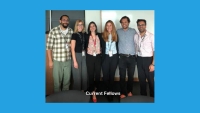Translational Clinical Research Fellowship on Substance Use Disorders
Columbia University Department of Psychiatry/New York State Psychiatric Institute

Leadership
Frances R Levin, MD
- Program Director
- Kennedy-Leavy Professor of Psychiatry in the Division of Substance Abuse at CUMC

Fellowship Overview
- Two-to-three-year postdoctoral training program for MD- and PhD-level candidates interested in clinical translational research careers in addiction.
- Continuously funded by the National Institute of Drug Abuse (NIDA T32) for nearly 3 decades.
- Designed for clinical scientists interested in gaining expertise from human behavioral pharmacology to implementation science to lead the next generation of addiction research.
- Recruiting talented, innovative, and motivated postdoctoral fellows from diverse backgrounds who are interested in pursuing clinical translational addiction research careers. Individuals from communities historically underrepresented in the addiction field are especially encouraged to apply.
Eligibility
MD and/or PhD with relevant research experiences in psychology, neuroscience, policy health, or a related field.
Resources
- Faculty expertise in neuroscience, human behavioral pharmacology, pharmacologic and psychotherapeutic treatment trials, the impact of policy on addiction treatment, community-engagement, and implementation science.
- Opportunities to engage in ongoing large research initiatives (e.g., the Clinical Trials Network, the Healing Community Study)
- Opportunities for senior and junior mentorship in designing their own program of research and pilot studies.
- Carefully planned training in the responsible conduct of research, rigor and reproducibility, and study
Fellowship Mentorship
Individuals interested in mentoring include:
- Aimee Campbell, PhD
- Ken Carpenter, PhD
- Sandra Comer, PhD
- Suzette Evans, PhD
- Richard Foltin, PhD
- Margaret Haney, PhD
- Jermaine Jones, PhD
- Frances Levin, MD
- John Mariani, MD
- Diana Martinez, MD
- Nasir Naqvi, MD
- Ned Nunes, MD
The Division on Substance Use Disorders
The Division on Substance Use Disorders is at the vanguard of cutting-edge addiction research spanning the translational spectrum that utilizes long-acting novel formulations for Opioid Use Disorder, ketamine for various substance use disorders, neuromodulation approaches for pain and psychiatric disorders, novel pharmacologic interventions for cannabis use disorders and innovative biomarkers to predict treatment responsivity, vaccines to prevent opioid overdose, new methodologies for community-engaged research, and testing implementation strategies across diverse health settings.
Interested in Applying?
Please contact us for applications and additional information.
Mildred Diaz

